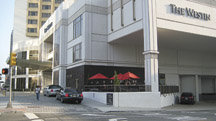With the summer vacation season about to kick into high gear, millions of visitors are expected to travel to the Big Apple before Labor Day. (Last year, an estimated 48.7 million people visited New York City – a record – according to a spokesman for Empire State Development.) The thriftiest of these visitors won’t be booking hotel rooms in SoHo or Midtown, or even in the outer boroughs, but rather right here in Jersey City.
With five hotels that are cheaper to book than their New York City counterparts, Jersey City touts itself as a competitive alternative to Manhattan.
Increasing Jersey City’s hotel tax could help save jobs and restore service cuts.
____________
Municipalities throughout the state of New Jersey receive a tax from each hotel room booked within their city. But the hotel tax charged is not uniform, and varies from one city to the next. Jersey City currently receives a hotel tax rate of 6 percent from every hotel room booked at the Courtyard Marriott, Westin, Doubletree, Hilton, and Ramada Inn – the city’s five hotels.
Compare this to the 14 percent hotel tax rate in both Atlantic City and Wildwood.
New York City receives a tax rate of 18 percent from its local hotels.
While Jersey City’s lower hotel tax makes its local hotels an economical alternative to comparable establishments across the river, some question whether the tax should be increased so the city can generate badly needed revenue during the current economic pinch.
Could help restore jobs, services
Jersey City currently gets between $4 million and $5 million annually from the hotel tax, according to City Hall. Raising the current 6 percent tax rate to 10 or even 8 percent would add millions more to the city’s coffers.
This, in turn, could help save jobs in a city that has recently seen layoffs and it could restore service reductions to municipal departments that have been closed due to staff furloughs and budget cuts.
“Until a few years ago cities [with populations of 150,000 or more] were prohibited by state statute from charging a hotel tax,” said Jennifer Morrill, spokesperson for Mayor Jerramiah T. Healy. This prohibition primarily affected New Jersey’s two largest municipalities – Jersey City and Newark. “Mayor Healy fought for state legislation to change this and in 2006 Gov. [Jon] Corzine signed legislation permitting this change… We were able to bring about an important change that provides some relief to the Jersey City taxpayers.”
But the current law, according to state Treasury spokesman William Quinn, caps hotel tax rates in these cities at 6 percent. A rate increase above 6 percent would require action by the New Jersey legislature and Gov. Christopher Christie.
Tax increase could be tricky
Increasing Jersey City’s hotel tax rate could be a tricky balancing act, according to Jim Kirkos, chief operating officer of the Meadowlands Liberty Convention & Visitors Bureau.
“I understand why municipalities are looking to generate revenue from any place they can. Everybody is struggling to provide municipal services. And Jersey City is no different than anyplace else,” acknowledged Kirkos. “And, typically, the argument is you’re not putting an excess burden on the taxpayers in town. You’re burdening the person who is coming into town. I think every region needs to look at [hotel taxes] with a competitive eye, and also with an eye toward investment.”
Kirkos said he agrees with Gov. Christie that this is a bad environment in which to raise taxes, “but I also understand the need to generate revenue. So, this is a tough issue.”
Since action by the governor would be required to increase Jersey City’s hotel tax rate, Healy would have to convince Christie that an increase is necessary.
Adding another wrinkle to the issue is Kirkos’ interest in seeing a portion of such taxes used for tourism promotion – something New Jersey does not do with money generated from hotel tax income.
At present, the revenue generated from hotel taxes gets divided between the state and the municipalities. But Kirkos has long argued that such taxes should also be split with tourism bureaus, a idea that many cities believe will eat into their hotel profits.
“When New Jersey established its hotel tax, it had a rather haphazard view because, in my view, no portion of the tax was ever dedicated towards promoting tourism, which is what generates the tax in the first place,” said Kirkos. “In just about every other major destination in other states, a portion of that tax typically goes to the tourism bureau…New Jersey doesn’t do that anywhere, except for Atlantic City.”
Typically, Kirkos added, regional travel bureaus get anywhere from half a percent to 1.5 percent from hotel tax fees to promote tourism.
Morrill said Jersey City already uses some of its Urban Enterprise Zone (UEZ) dollars for tourism promotion. However, Christie has suspended the UEZ program and it’s unclear whether UEZ money will be available in the future.
E-mail E. Assata Wright at awright@hudsonreporter.com.
